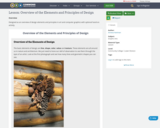
Designed as an overview of design elements and principles in art and computer graphics with optional hand-on activity.
- Subject:
- Graphic Arts
- Material Type:
- Lesson
- Author:
- Annesa Hartman
- Date Added:
- 09/18/2021

Designed as an overview of design elements and principles in art and computer graphics with optional hand-on activity.

Conversation Activities | The Pathways Project
Short Description:
Let’s Chat! French features a collection of nearly 100 classroom-ready interpersonal speaking activities for novice and intermediate learners. Touching on a range of thematic topics such as free time activities, food, daily routines, health, the environment, art and so much more, French teachers are sure to find an activity to use in their courses. These activities may be used as is or can easily be revised and remixed to fit the unique needs of individual classrooms.
Long Description:
Let’s Chat! French features a collection of nearly 100 classroom-ready interpersonal speaking activities for novice and intermediate learners. Touching on a range of thematic topics such as free time activities, food, daily routines, health, the environment, art and so much more, French teachers are sure to find an activity to use in their courses. These activities may be used as is or can easily be revised and remixed to fit the unique needs of individual classrooms.
Are you a language instructor using Pathways Project Activities? We would love to hear from you. CLICK HERE to provide your feedback and share back activities you revised with the Pathways Community.
The Pathways Project, an initiative from the Department of World Languages at Boise State University, is a collaborative network of open educational resources (OER) including instructional language teaching materials and professional development created by and uniquely for Idaho’s K-16 language teachers and students.
Teachers and students participating in the Pathways Project come from different fields of study and schools across Idaho to create open (i.e., free), digital activities that support the teaching and learning of foreign languages and promote intercultural competence. We hope to impact the opportunities learners have to connect to the global world!
Visit the Pathways Project Website to learn more.
Word Count: 102757
(Note: This resource's metadata has been created automatically by reformatting and/or combining the information that the author initially provided as part of a bulk import process.)
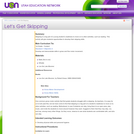
Skipping is a big part of a young studentŐs readiness to move on to other activities, such as reading. This activity will give students opportunities to develop their skipping skills.
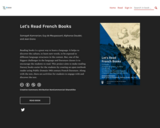
Short Description:
Reading books is a great way to learn a language. It helps to discover the culture, to learn new words, to be exposed to different language structures in the context. But, one of the biggest challenges in the language and literature classes is to encourage the students to read. This project aims to make reading literary books easier for the students by creating an open textbook reader using Public Domain 19th century French literature. Along with the text, there are activities for students to engage with and discover the text.
Word Count: 37020
ISBN: 978-0-88865-455-7
(Note: This resource's metadata has been created automatically by reformatting and/or combining the information that the author initially provided as part of a bulk import process.)

Overview: Presented in five consecutive standard-period classes, students will think critically about an experience in their lives that have made a lasting, positive impact for which they are grateful. Students will write and hone rough drafts, give and solicit peer review and teacher critique, and develop a three-minute oral presentation of the final draft to their class. Lesson by Jarvis L. Reed.
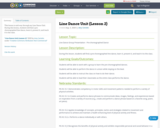
This lesson is mid-way through my Line Dance Unit. During this lesson, students will find a pre-choreographed line dance, learn it, present it, and teach it to the class.
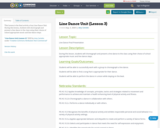
This Lesson is the final activity of my Line Dance Unit. During this lesson, students will choreograph and present a line dance to the class using their choice of school appropriate music and line dance steps.
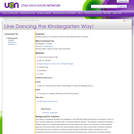
In this lesson students perform a line dance to reinforce story telling through movement.
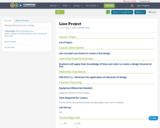
Nebraska FCS Classes: Intro to Design
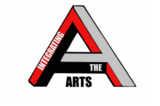
This resource was created by Terresa Greenleaf, in collaboration with Dawn DeTurk, Hannah Blomstedt, and Julie Albrecht, as part of ESU2's Integrating the Arts project. This project is a four year initiative focused on integrating arts into the core curriculum through teacher education, practice, and coaching.
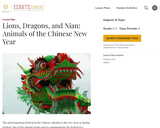
The most important festival in the Chinese calendar is the New Year or Spring Festival. One of the annual events used to commemorate the festival is a colorful parade complete with animated dragon and lion figures.
In the first activity the student will learn the major differences between Eastern and Western dragons and discover why Eastern dragons are associated with Chinese New Year. They will hear a story about how the dragons came to rule major rivers of China. In the second activity, they will also learn about the Chinese New Year Dragon Parade and discover why firecrackers are used to drive off evil spirits, especially one called the Nian. In the third activity the students will see images of parading dragons, including sound-enhanced video and read poems about the New Year. In the fourth lesson the students will discover that the Chinese lion has imaginary characteristics similar to the dragon. They will view images of the lion and hear about how this highly stylized beast once fought the ferocious Nian. They will learn about the lion dancers in the New Year parade and compare them to the dragon dancers. Finally they will make their own lion masks.
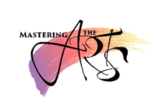
This resource was created by Kate Steffen, in collaboration with Lynn Bowder, as part of ESU2's Mastering the Arts project. This project is a four year initiative focused on integrating arts into the core curriculum through teacher education and experiential learning.
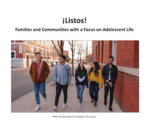
¡Listos! is a series of units for Heritage Spanish learners in grades 6-12. Three lessons aligned to the K12 Texas Essential Knowledge and Skills (TEKS) form four thematic clusters. Relevant scenarios related to personal life, college tasks, career readiness and civic participation frame each lesson and increase student engagement by making learning authentic and relevant to real issues that students face. Each lesson identifies an intermediate or advanced proficiency target that supports language acquisition in the interpersonal, interpretive and presentational modes. The project also provides teachers with a replicable approach to lesson design for adapting or creating their own materials.

The attached Remote Learning Plan is designed for Grade 7 English Language Arts students. Students will learn the different literary terms found in literature and poetry. They will have opportunity to practice their understanding of these terms by playing a number of online games. Students will then determine which literary device is being used in lines of literature and poetry through the practice at the end of lesson. This Remote Learning Plan addresses the following NDE Standard: NE LA 7.1.6.cIt is expected that this Remote Learning Plan will take students 90 minutes to complete.

The attached Lesson Plan is designed for Grade 7 English Language Arts students. Students will be reminded of the different literary devices by listening and watching a video that has a catchy beat. Students will then show what they know with 10 lines of poem which includes literary devices. If they are still uncertain of all the devices, another video is available to them to watch. The last section gives them the opportunity to look for literary devices being used by the author in Freak the Mighty. When students become aware of these devices, they will write them down, label them, and then explain how the device made the reading better. This Lesson Plan addresses the following NDE Standard: NE LA 7.1.6.cIt is expected that this Remote Learning Plan will take students 90 minutes to complete.
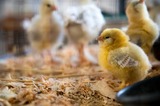
Students will analyze animals against a standard ideal, and explain the relationship between an animal’s form and function.

Students will be able to use correct terminology for livestock (e.g. bovine, steer, ewe, ram). This lesson is used in exploring agriculture, animal science lesson. Written by Kathryn Savat.

Date of this Version
Spring 2019
Document Type
Portfolio
Citation
Kenworthy, Celeste and Aurora Kenworthy. "Living World Club." After school club lesson plans. University of Nebraska-Lincoln, 2019.
Comments
Copyright 2019 by Celeste Kenworthy under Creative Commons Non-Commercial License. Individuals and organizations may copy, reproduce, distribute, and perform this work and alter or remix this work for non-commercial purposes only.
Abstract
An afterschool club that focuses on building understanding and enjoyment of nature and the environment through interactive and collaborative activities.
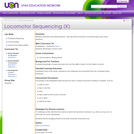
In this lesson students must listen and follow directions. They will perform locomotor movements based upon those directions.

This OER activity was created by Anita Saalfeld and reviewed by Chrystal Liu as part of the 2023 World Language OER Summer work and training. Educators worked with NDE staff to create OER Learning Plans and materials. The attached activity is designed for 9 - 12 World Language teachers for students at Novice Mid to Intermediate Mid proficiency level in Spanish. Students will shop on a Spanish-language website to create an outfit, and then they will vote on their favorite outfits across a variety of categories. This activity addresses the following NDE World Language Standard(s): NE WL 1.2 and NE WL 4.2.It is expected that this activity will take students about 15-20 minutes to complete.